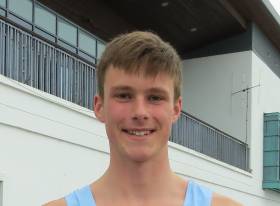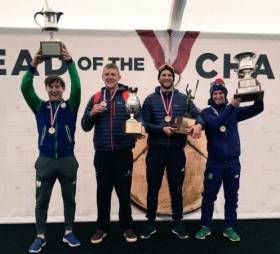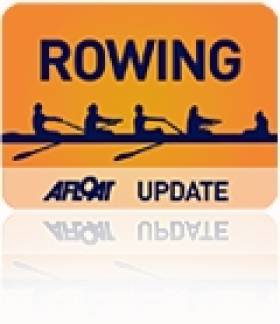Displaying items by tag: Collins
Shandon Excel at Cork Head of the River
#Rowing: Shandon amassed a big set of wins at the Cork Head of the River at the Marina on Saturday. Their men’s senior quadruple, competing in the fourth head, set the fastest time of 12 minutes 3.4 seconds, while their men’s senior eight were just .6 of a second slower. They competed in head one and were the second-fastest crew overall. Jack Dorney was the fastest single sculler.
Cork Boat Club's women reeled off a set of wins. The fastest women’s crew was their club two eight, while Grace Collins of the same club was the fastest women’s single sculler.
Cork Head of the River, The Marina, Saturday (Selected Results)
Overall: 1 Shandon men’s senior quadruple 12 minutes 3.4 seconds (Head Four), 2 Shandon men’s senior eight 12 mins 4 secs (Head One), 3 Cork men’s inter eight 12:17.3 (H1).
Men
Eight – Senior: Shandon 12:04.0. Inter: Cork 12.17.3. Club Two: Shandon 13.13.
Four – Sen: Shandon 12:37. Inter, coxed: Shandon 13:55.3. Club Two, coxed: Waterford 15:41.6. Jun 18A, coxed: Shandon 14:13.3.
Pair – Sen: Cork A 13:44.1. Jun 18A: Fermoy 14:28.9. Jun 16, coxed: Presentation (Rolling Head) 14:24.6. Masters, coxed: Shandon (b) 15:17.4.
Sculling – Quadruple – Sen: Shandon 12:03.4. Inter: Shandon 12:36.2. Jun 18A: Lee B 12:53.1. Masters, coxed: Shandon A (a) Rolling Head 15:24.8
Double – Club Two: Shandon 15:27.5. Jun 18A: Cork 13:41.3.
Single – Sen: 1 Shandon (J Dorney, sen, H2) 15:18.8. Inter: Cork (C O’Sullivan) 15:44.7. Club Two: Lee (P Hearty) 18:11.1. Jun 18A: Lee (A Sheehan, H2) 15:30.2. Jun 16: Kenmare (T Kelly) 15:48.7. Masters: Shandon (H Merz, d; Rolling Head) 15:25.7.
Women
Eight – Club Two: Cork 14:28.5. Pair - Sen: Cork 16:47.2. Jun 18: Cork A 16:08.
Four – Club Two, coxed: Cork A 15:04.9. Masters, coxed: Cork (d) 16:38.4.
Sculling – Quadruple – Inter: Cork 15:27.3. Jun 18A: Shandon A 15:23.1. Jun 16, coxed: Lee 16:19.2. Masters, coxed: Graiguenamanagh (b) 17:15.2.
Double – Inter: Cork A 15:11. Jun 18A: Lee A 15:37.3.
Single – Inter: Cork (G Collins) 16:13.4. Club Two: Shandon (J Legresley) 16:01.5. Novice: Lee (O Commins) 17:35.9. Jun 18A: Kenmare (E Crowley) 15:38.7. Jun 16: Shandon (J Forde) 15:55.9. Masters: Shandon (J Legresley; b) 17:49.8 (Rolling Hd)
More Rowing Glory for O'Donovan Brothers
#Rowing: Paul and Gary O’Donovan have another set of medals to add to their 2016 collection. Sculling with John Collins and Jonny Walton of Leander (the British Olympic double) they had the fastest raw time in the Directors’ Challenge Men’s Quads at the Head of the Charles Regatta in Boston. While the result was given as a win for “Fruit Loops”, a Masters crew which was given a handicap, the Irish/British crew were presented with the medals.
In 2016 Gary and Paul won gold at the European Championships, silver at the World Cup Regatta in Italy, silver at the Olympic Games, and took winners’ medals at the Irish Open as a double. Paul also won gold at the World Championships as a lightweight single sculler and won the Irish Open single sculls.
#ROWING: The Irish challenge in the Double Sculls at Henley Royal Regatta was ended this morning as the British national crew of John Collins and Jonathan Walton beat Dave Neale and Eimantas Grigalius of Three Castles. The British, who have been finalists at the European Championships and the World Cup in Aiguebelette, were half a length up by the top of the Island and three lengths up at 500 metres. The winner was never in doubt from that point.
Henley Royal Regatta, Day Three (Selected Results; Irish interest)
Double Sculls Challenge Cup (Men, Open): Leander (J Collins, J Walton) bt Three Castles (D Neale, E Grigalius) 2l, 7 mins 48 secs.
































































